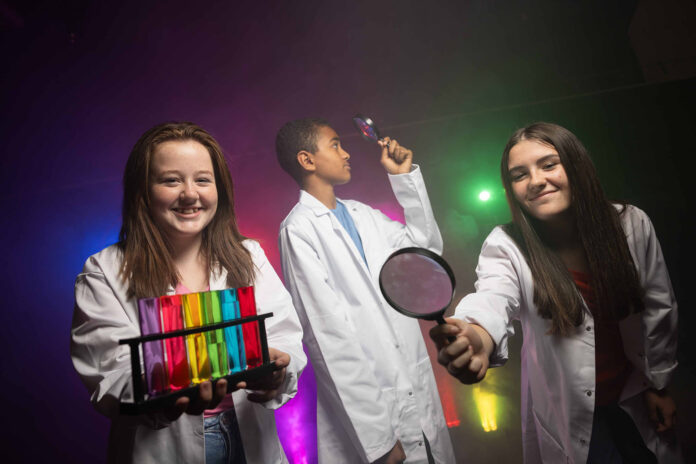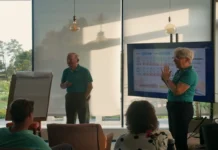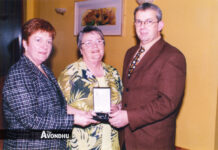
The top themes emerging from the project entries for the 2024 BT Young Scientist & Technology Exhibition (BTYSTE) have been revealed, with secondary school students from across the island of Ireland interested in learning more about AI, diversity & inclusion and mental health.
With a host of local entries now accepted and confirmed for the January finals, schools who entered the 2024 BTYSTE were notified of results on Wednesday, 25 October. In total, 550 projects and hundreds of students will represent their school and community at the finals.
From January 10th to 13th, hundreds of students will showcase their innovative ideas in the areas of Social & Behavioural Sciences, Technology, Chemical, Physical & Mathematical Sciences, Biological & Ecological Sciences, and a brand-new category being introduced for 2024, Health and Wellbeing.
LOCAL SCHOOLS
Entries include the following projects from area schools:
Coláiste Fionnchua, Mitchelstown have 3 group entries in three different categories: a) A study of the benefits gained by adopting a rescue dog (Health & Wellbeing); b) Women in Agriculture (Social & Behavioural Sciences) and c) An investigation into a new taxonomy of exoplanets (Chemical, Physical & Mathematical Sciences).
Quantum Computing in the Renewable Energy Industry is accepted as an individual entry in the Technology category for Loreto Secondary School, Fermoy; the school also have a Social & Behavioural Sciences category entry – Female adolescents perceptions on the dangers of acrylic nail extensions and less harmful alternatives.
Scoil Pól in Kilfinane have 3 group entries: 60 years of BTYSE (Social & Behavioural Sciences category); Optimising glucose levels: impact of combining vegetables and protein (Health & Wellbeing) and Stay alive, Phone aside: The No- Phone Zone Project (Technology). The Kilfinane school’s sole individual entry is in the Social & Behavioural Sciences category, An investigation into the uses of artificial intelligence in the modern world and the benefits or problems it may cause.
Blackwater Community School, Lismore have 2 entries – Are Observatories Seeing as Much as They Can?, which is a group entry in the Chemical, Physical & Mathematical Sciences category. Also, an individual entry in the Biological & Ecological category is Threats to Ireland’s upland wildlife and possible solutions.
Davis College, Mallow have 2 Technology entries, ‘Smart embedded clothing for the Visually Impaired’, along with ‘Dual Purpose Glasses’.
Glanmire Community College have four group entries, the following 2 in the Social & Behavioural Sciences category – Driven by Data; and Assessing the Proportions of Intrinsically Motivated Versus Extrinsically Motivated Students. In the Technology category their entry is Solar Safe. While in the Biological & Ecological category, their entry is The Changing Trends of Smoking Associated Litter on the Cork Coast: A Quantitative Analysis. Their sole individual project is the Effects of chess playing on the cognitive ability of elderly people (Social & Behavioural Sciences).
Colaiste An Phiarsaigh, Glanmire have 9 group entries accepted – in the Technology category, they have Communicating Plants for Smart Water Conservation; in the Health & Wellbeing category, they have two entries – a) Cén éifeacht a bfhuil ar aclaíoct ar do cuid codhladh? and b) Cé Mheád Bactéir Atá Ar Do Scuab Smideadh?; Two entries in the Chemical, Physical & Mathematical Sciences category – a) An calc is fearr i gcomhair dreapadóirí and b) Tástáil Baictéir ar Fón. The Glanmire school have 4 entries in the Social & Behavioural Sciences category – a) An bíonn tioncar ar na rialcha sa bhaile ar d’iompar; b) Conas a athríon dath ár mbia conas a bhlasann sé? C) Conas a cuirfidh steiréaphlátaí diffriocht ar shaol leanaí? d) Cad a dheanann fógra méan sóisialta?
HEALTH AND THE ENVIRONMENT TOP CATEGORIES
Of all the submissions for the 2024 exhibition, the most common project titles are focused on health (16%); mental, menstrual, sleep, medicine, ageing, behaviour. Mental health project entries covered a broad range of topics, such as beauty standards, sports performance, exercise and sleep. 2% of all entries specifically investigated the health and environmental implications of vaping, which suggests the awareness and concerns of young people around vaping.
AI accounted for 4% of all entries, with projects looking at how programmes such as Chat GPT can be used effectively in education and health. Diversity & Inclusion was another topic of interest for students this year. Of all entries, 3% focus on developing apps and technology to help improve the daily lives of those with physical disabilities. Neurodiversity (autism, in particular) was another emerging theme, suggesting growing interest from young people in the ways that technology can improve the lives of neurodivergent people.
Similar to previous years, the environment continues to be a strong trend within entries, with 11% of all projects covering the topic, from ways to become more sustainable, to environmentally friendly farming practices, microplastics, natural fertilisers and even fast fashion.
Young peoples’ interest in sport remains high, with 9% of projects investigating topics ranging from sports injuries to performance, as well as the use of technology within sports, gender, and mental health. Furthermore 6% of all projects also delve into education, investigating areas from mental health to academic success, innovation, and the use of apps and devices within classrooms and learning environments.









